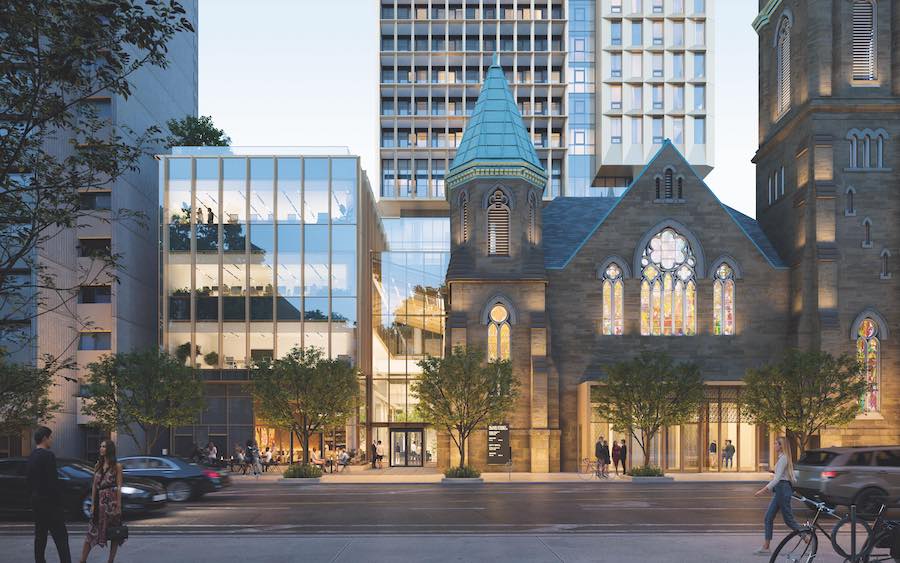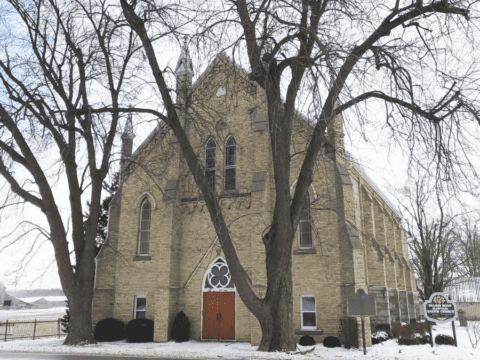The leasing arrangement in a downtown Toronto development between The United Church of Canada and the Anglican Church of Canada has been stalled indefinitely while the Anglican Church sorts out whether the agreement between the churches signed last year is “legally enforceable.”
The problem stems from a financial agreement signed by the United Church, Anglican Church and the Presbyterian Church in Canada. The three denominations agreed last year to share offices at Bloor Street United’s redeveloped property at 300 Bloor St. West. At a recent General Synod meeting, Canon (lay) Clare Burns told Anglican Church members that the agreement was signed before it received approval from its General Synod and therefore may not be valid. A completion date for the 300 Bloor St. West project is still unknown.
You may unsubscribe from any of our newsletters at any time.
Archdeacon Alan Perry, general secretary of General Synod, and treasurer and chief financial officer Amal Attia signed the lease in April 2024. Perry is now on a leave of absence.
Harry Li, executive officer of finance for the General Council of the United Church, states emphatically that before signing, each of the three parties followed a rigorous protocol.
“From our perspective, we followed the process strictly. And the other thing to add is before the lease agreements were signed, each denomination hired their own legal consultant and spent considerable time reviewing the lease agreement. So, all that being said, I’m quite surprised about the recent news,” he said in an interview with Broadview.
“But we really respect the Anglican Church’s internal process and affirm the importance of transparency and accountability in all ecumenical partnerships,” Li added.
A statement from the Anglican Church which was forwarded to Broadview reads: “The General Synod of the Anglican Church of Canada has hired Doane Grant Thornton to investigate the manner in which the lease for 300 Bloor Street West was approved. We will refrain from comment pending the outcome of the investigation.” A report from the accounting firm is expected at the end of July.
The United Church signed a lease with Bloor Street United in 2024 and agreed to sub-lease space to the Anglican and Presbyterian churches.
According to a recent article in the Anglican Journal, the overall cost to the Anglican Church for the five-year lease is $8.18 million. That includes about $1 million a year in rent and $3 million in construction costs for the office site that would be sub-leased.
More on Broadview:
- 3 things changing at this year’s General Council
- Sanctuary fire sparks renewal in Kamloops United Church
- The church union that was — and wasn’t
But Li says those numbers are incorrect. He declined to share the base rent for the office space, which is just the occupancy fee and doesn’t include the tenant’s share of the building’s operating expenses (which are covered by additional rent), but said that Bloor Street United and the General Council Office agreed to the base rent in 2012.
“Bloor Street United Church has graciously committed to honouring that same rate, which is knowingly below the current market rate in the area,” he said over email. “As sublandlord, the General Council Office passes this economic benefit on to its ecumenical partners, who occupy the space as subtenants.”
Further, Li says the construction costs are being overstated: “This cost would be amortized over the useful life of the entire leasehold improvement period. So that’s typically ranging from 10 to 15 years,” he said.
Still, Anglican Church members are concerned about rising costs. The Anglican Church currently owns property at 80 Hayden St. in Toronto, which includes its national office as well as the offices of Alongside Hope and the Anglican Foundation of Canada. In an article in the Anglican Journal, Canon (lay) Clare Burns, Chancellor of General Synod, estimated that the property costs the church about $425,000 annually, although revenue including rent collected from the two non-profits brings the net cost down to $250,000.
A 2020 pre-pandemic assessment by investment firm Colliers estimated that General Synod could receive $14 million to $17 million from sale of the property, according to Journal reporting. General Synod then approved giving the general secretary authority to sign a non-binding memorandum of understanding that would move forward the project to share new office space with the United and Presbyterian churches.
While the Anglican Church property has been for sale since before the pandemic in 2020, the church has not yet received an acceptable offer.
Li also pointed out that “…all three denominations made a public announcement about the signing ceremony, and I also recall the Anglican Journal published an article about the signing ceremonies. I think the three denominations were quite excited about this ecumenical collaboration exercise because of the potential to work together and also realize some of the synergies in term of cost-sharing opportunities.”
The Anglican Church brought up two other issues at a recent General Synod meeting, according to the Anglican Journal: accommodation for the two non-profits that are currently housed in the Hayden Street property appears to have been omitted from the new office space; and that it’s unknown whether the new site would have the right conditions to safeguard the Anglican Church’s archives.
Space for the two non-profits is a question for the Anglican Church to answer, Li said. “It is entirely their decision.”
The archive space is a separate issue entirely from the leasing arrangement, says Li. “We hired an independent consultant and an architect company to help us design a space that meets each denomination’s needs, and the capital expenditure associated with the archives has been tracked separately and allocated to each denomination based on their requirement,” Li said.
The question remains: what happens if the Anglican Church decides to pull out of the lease agreement. Will the United Church seek another partner? Will it sue the Anglican Church for breach of contract? Or will the entire project be put on hold?
“We haven’t even started thinking about that,” said Li. He still believes that the leasing arrangement makes “economic sense” for all the parties. But there are currently no negotiations between the United Church and the Anglican Church regarding the matter.
“Even though post-COVID, the cost for capital expenditures increased significantly…the numbers are still holding up and the fundamental values for why the three denominations started this exercise are still true. I hope [the Anglican Church] can pass this process and see the value in continuing the project,” Li said.
***
Gillian Steward is a writer in Calgary.














